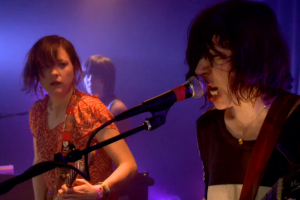I hear this is some sort of indie punk supergroup?

[Video][Myspace]
[6.70]
Michelle Myers: Evidently Wild Flag is some sort of indie punk supergroup. I was too young to ever care about Sleater-Kinney, but this song makes me want to visit their back catalog for a few weeks. “Future Crimes” is hooky and memorable, and Carrie Brownstein’s vocal performance is totally spot-on.
[8]
Sally O’Rourke: Put off at first by the thin production, then won over by the low-fi keyboards and the resigned anger in Carrie Brownstein’s voice. I really am going to have to start listening to Sleater-Kinney, aren’t I?
[8]
Katherine St Asaph: I’m biased. I either like or love all the component bands here, liked spiritual precursor The Spells, and would thus endorse Wild Flag existing even if their first single was a lot of low-fi mumbling or “E.T.” or something. The world, for their part, would likely endorse them if they came out with a big, stones-out Announcement Single. Instead, they keep “Future Crimes” self-contained, filter-dripping all the excitement into the tinkly keyboard riff and soprano swoops, and it is excellent. And even though Wild Flag probably has about the same longevity of someone who makes jewel-encrusted Osama bin Laden figurines, at least they’re here in the interim.
[8]
Michaela Drapes: I guess I can admit this here: Wild Flag are rapidly turning into the vegetables I don’t want to eat, but I know are good for me. The chores I don’t want to do, but I know I’ll hate myself if I don’t dust all my white consoles this week and scrub the bathtub. Academically, I like 60 per cent of the elements at play here: Janet Weiss is a personal hero, Rebecca Cole rules big time, and Britt Daniel can, um, produce my single whenever he wants. But ugh, do they have to let Mary Timony sing lead? I guess it’s better than when Carrie does, but that’s not saying much.
[6]
Alfred Soto: Carrie Brownstein is an old friend, so I’m prepared to forgive the fire blanket thickness of her voice, which was made for dusky harmonies and contrapuntal interjections. Because the rhythm and guitar strum are American indie at its most basic, I want more.
[6]
Doug Robertson: I was about to dismiss this out of hand as being generic grumpy girl indie, but then it suddenly got really good in the last thirty seconds so I’ve had to reconsider. Admittedly by “Really good,” I mean “Got a bit faster”, so it’s not like they suddenly broke new ground and started swimming in an Olympic sized pool of inventiveness, but at least it’s a start.
[6]
Chuck Eddy: Saw two different people wearing their T-shirt at mid-June’s Austin Girls Rock Camp end-of-week show (best band: Hello, My Name Is Irrelevant), and couldn’t place who they were or where I’d heard their name before. Got home and looked it up; oh yeah: Sleater-Kinney nostalgia, got plenty of SXSW hype. Way, way too soon for me; my copies of Call the Doctor and Dig Me Out probably haven’t even been banished to one of the four big CD-limbo boxes in my office closet for two years yet, and the other albums are long gone. That neo-neo-new-wavish cheese-organ line (the Need nostalgia? Le Tigre nostalgia?) doesn’t exactly solve the problem, either.
[6]
Jer Fairall: Lacks both the confrontational and eccentric charge of the collaborators’ best known work, and I fear that I’m in danger of liking it more for the fact of its existence than for anything it actually does, but it still provides a decent object lesson for Kids Today on how to sound stripped down without sounding like shit. -wavers and -gazers, please take note.
[6]
Pete Baran: I wonder how easy it would be to make a song like this just using a sampler? Surely every guitar sound, every half-arsed indie word has been enunciated. All that would be left is the ghost in the machine, a track’s ineffable personality, which this sort of has. Sorry, that’s probably a bit of a big question to dump on Wild Flag.
[6]
Jonathan Bradley: One successful indie rock tactic involves holding back and coyly invite the listener to pursue pleasure rather than gorge on it. That method is not necessarily a superior kind, but it does offer a different kind of enjoyment, and one that must be approached differently. The pedigree of Wild Flag suggests the supergroup knows how to accomplish this task, and “Future Crimes” has a rhythm stiff enough and a melody apparent enough to suggest the tune’s plainness hides greater depths. It never quite bursts into bloom the way a properly anthemic single should and it has that same feeling of mistaken briefness as Elvis Costello’s “Welcome to the Working Week,” but that element of reservation just encourages me to play it again.
[7]
Leave a Reply